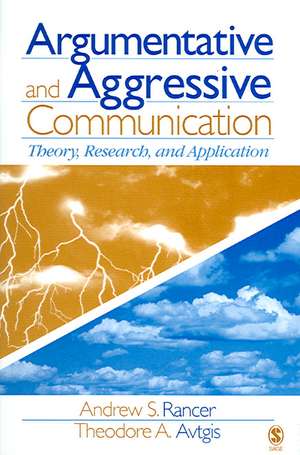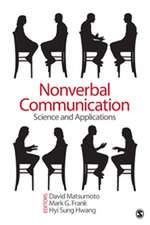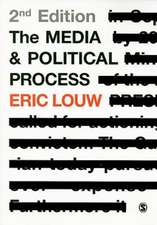Argumentative and Aggressive Communication: Theory, Research, and Application
Autor Andrew Rancer, Theodore A. Avtgisen Limba Engleză Paperback – 22 mai 2006
In addition to fully describing the two predispositions and their measurement, it synthesizes the large corpus of research in several communication contexts, including family, organizational, intercultural, instructional and mediated contexts. It provides prescriptions for managing aggressive communication in these contexts. A final chapter provides conclusions drawn from this literature, as well as offers suggestions for future work on aggressive communication.
| Toate formatele și edițiile | Preț | Express |
|---|---|---|
| Paperback (1) | 556.76 lei 6-8 săpt. | |
| SAGE Publications – 22 mai 2006 | 556.76 lei 6-8 săpt. | |
| Hardback (1) | 846.14 lei 6-8 săpt. | |
| SAGE Publications – 22 mai 2006 | 846.14 lei 6-8 săpt. |
Preț: 556.76 lei
Preț vechi: 655.01 lei
-15% Nou
Puncte Express: 835
Preț estimativ în valută:
106.55€ • 110.83$ • 87.96£
106.55€ • 110.83$ • 87.96£
Carte tipărită la comandă
Livrare economică 15-29 aprilie
Preluare comenzi: 021 569.72.76
Specificații
ISBN-13: 9780761930891
ISBN-10: 0761930892
Pagini: 336
Dimensiuni: 152 x 229 x 18 mm
Greutate: 0.45 kg
Ediția:1
Editura: SAGE Publications
Colecția Sage Publications, Inc
Locul publicării:Thousand Oaks, United States
ISBN-10: 0761930892
Pagini: 336
Dimensiuni: 152 x 229 x 18 mm
Greutate: 0.45 kg
Ediția:1
Editura: SAGE Publications
Colecția Sage Publications, Inc
Locul publicării:Thousand Oaks, United States
Recenzii
"This is the first book to discuss the history, research and application of the positive and deleterious communication traits of argumentation and verbal aggressiveness. The handbook's clear style makes it accessible to any intelligent, motivated, critically analytical reader or educated layperson: from undergraduates and graduates, to teachers and researchers on any level, to those in the applied world, such as practicing psychologists and, of course counselors, managers, and politicians. Even secondary and tertiary school teachers ought to convey certain information to their students to prepare them for life."
Cuprins
Part I: The Structure and Origin of Argumentative and Aggressive Communication
1. What are Argumentative and Aggressive Communication?
The Genesis of the Theory of Argumentative and Aggressive Communication
Purpose of This Book
The Importance of Communication Traits
What are Communication Traits?
What is Aggressive Communication?
Constructive Aggressive Communication Traits
Categories of Trait Argumentativeness
Destructive Aggressive Communication Traits
Causes of Verbal Aggressiveness
Argumentative and Aggressive Communication Traits and Personality Theory
The Dimensions of Personality
The Relationship Between Temperament and Aggressive Communication Traits
Conclusion
Discussion Questions for Chapter 1
2. Measuring Individual Differences in Argumentative and Agressive Communication
Measuring the Argumentative and Verbal Aggressiveness Traits
The Development of the Argumentative Scale
The Development of the Verbal Aggressivness Scale
Challenges to the Scales
Critiques of the Argumentativeness Scale
Critiques of the Verbal Aggressiveness Scale
Alternative Methods of Assessing Argumentative and Aggressive Communication
Assessing Beliefs About Argumentative and Aggressive Communication
Conclusion
Discussion Questions for Chapter 2
3. Trait, State, and Interactionist Approaches to Studying Argumentative and Aggressive Communication
The Trait Perspective on Argumentative and Aggressive Communication
The Situationist Perspective on Argumentative and Aggressive Communication
Situational Factors: Topic and Topic Salience
Situational Factors: The Adversary's Attributes
Argument Topic
Context and Characteristics as Situational Influences
The Interactionist Approach to Argumentative and Aggressive Communication
Conclusion
Discussion Questions for Chapter 3
Part II: The Function of Argumentative and Aggressive Communication
4. Argumentative and Aggressive Communication in Relational and Family Contexts
Argumentativeness and Verbal Aggressiveness in General Interpersonal Relationships
Friendship Relationships
Dating Relationships
Family Relationships
Marital Relationships
Argumentativeness, Verbal Aggressiveness, and Interspousal Violence
Sibling Pairs
Parent-Child Dyads
Conclusion
Discussion Questions for Chapter 4
5. Argumentative and Aggressive Communication in Organizational Contexts
Organizational Satisfaction
Argumentativeness, Verbal Aggressiveness and Satisfaction
Argumentativeness, Verbal Aggressiveness and Gender Differences in the Organization
Argumentativeness, Verbal Aggressiveness and Other Organizational Constructs
Conclusion
Discussion Questions for Chapter 5
6. Argumentative and Verbally Aggressive Communication in Instructional Contexts
The Influence of Instructor Trait Argumentativeness
The Influence of Instructor Trait Verbal Aggressiveness
The Influence of Instructor Use of Verbally Aggressive Messages
Characteristics of the Argumentative Student
Conclusion
Discussion Questions for Chapter 6
7. Argumentative and Aggressive Communication in Intercultural and Intracultural Contexts
Co-Cultural Differences in Argumentative and Verbal Aggressiveness
Regional Differences in Argumentativeness and Verbal Aggressiveness
West Meets West
East Meets West
Conclusion
Discussion Questions for Chapter 7
8. Argumentative and Aggressive Communication in Mass and Mediated Communication
Social Learning, the Media and Aggression
Television Situation Comedies
Comparing Sitcoms to Other Television Genres
Televised Wrestling
Music
Other Mediated Communication Research
Conclusion
Discussion Questions for Chapter 8
9. Argumentative and Aggressive Communication in Persuasion and Social Influence Situations
An Orientation to Persuasion
An Orientation to Compliance-Gaining
Persuasion and Compliance-Gaining Research: A focus on Traits
A Transactional Approach to Argumentativeness and Persuasion
Processing Persuasive Messages: The Influence of Argumentative and Aggressive Communication
Argumentativeness, Verbal Aggressiveness and Compliance-Gaining Behavior
Determining Intentions to Argue: Testing Two Frameworks
Argumentative and Aggressive Communication and Resistance to Persuasion
Conclusion
Discussion Questions for Chapter 9
Part III: Enhancing Communicative Outcomes Through Improved Understanding of Argumentative and Aggressive Communication Processes
10. Modifying Argumentative and Aggressive Communication
The Call for Training
The Inventional System
Training Adults to Argue Constructively
Training in Argument
Training Adolescents to Argue Constructively
Conclusion
Discussion Questions for Chapter 10
11. Relating Argumentative and Aggressive Communication with Apprehension, Adaptation and Personality Traits
The Relationship of Argumentativeness, Verbal Aggressiveness and Apprehension Traits
The Relationship of Argumentativeness, Verbal Aggressiveness and Personality Traits
Conclusion
Discussion Questions for Chapter 11
12. Advancing Research and Theory-Building Efforts on Argumentative and Aggressive Communication
A Problem-Centered Approach to Communication Inquiry
The Research Contributions
A Focus on the Message/Individual
Cultural Influence Focus
Theoretical Foundation/Meta-Theory Focus
Measurement/Theoretical Refinement Focus
Conclusion
Discussion Questions for Chapter 12
Appendix A - The Argumentativeness and Verbal Aggressiveness Scales
Appendix B - The Adolescent Argumentativeness and Verbal Aggressiveness Scales
Appendix C - Short-Form Versions of the Argumentativeness and Verbal Aggressiveness Scales
Appendix D - The Affective-Behavioral-Cognitive Scale (ABCAS)
Appendix E - The Indirect Interpersonal Aggressiveness Scale
Appendix F - The Beliefs About Arguing Measure
Appendix G - Additional Resources on Argumentative and Aggressive Communication
References
Index
1. What are Argumentative and Aggressive Communication?
The Genesis of the Theory of Argumentative and Aggressive Communication
Purpose of This Book
The Importance of Communication Traits
What are Communication Traits?
What is Aggressive Communication?
Constructive Aggressive Communication Traits
Categories of Trait Argumentativeness
Destructive Aggressive Communication Traits
Causes of Verbal Aggressiveness
Argumentative and Aggressive Communication Traits and Personality Theory
The Dimensions of Personality
The Relationship Between Temperament and Aggressive Communication Traits
Conclusion
Discussion Questions for Chapter 1
2. Measuring Individual Differences in Argumentative and Agressive Communication
Measuring the Argumentative and Verbal Aggressiveness Traits
The Development of the Argumentative Scale
The Development of the Verbal Aggressivness Scale
Challenges to the Scales
Critiques of the Argumentativeness Scale
Critiques of the Verbal Aggressiveness Scale
Alternative Methods of Assessing Argumentative and Aggressive Communication
Assessing Beliefs About Argumentative and Aggressive Communication
Conclusion
Discussion Questions for Chapter 2
3. Trait, State, and Interactionist Approaches to Studying Argumentative and Aggressive Communication
The Trait Perspective on Argumentative and Aggressive Communication
The Situationist Perspective on Argumentative and Aggressive Communication
Situational Factors: Topic and Topic Salience
Situational Factors: The Adversary's Attributes
Argument Topic
Context and Characteristics as Situational Influences
The Interactionist Approach to Argumentative and Aggressive Communication
Conclusion
Discussion Questions for Chapter 3
Part II: The Function of Argumentative and Aggressive Communication
4. Argumentative and Aggressive Communication in Relational and Family Contexts
Argumentativeness and Verbal Aggressiveness in General Interpersonal Relationships
Friendship Relationships
Dating Relationships
Family Relationships
Marital Relationships
Argumentativeness, Verbal Aggressiveness, and Interspousal Violence
Sibling Pairs
Parent-Child Dyads
Conclusion
Discussion Questions for Chapter 4
5. Argumentative and Aggressive Communication in Organizational Contexts
Organizational Satisfaction
Argumentativeness, Verbal Aggressiveness and Satisfaction
Argumentativeness, Verbal Aggressiveness and Gender Differences in the Organization
Argumentativeness, Verbal Aggressiveness and Other Organizational Constructs
Conclusion
Discussion Questions for Chapter 5
6. Argumentative and Verbally Aggressive Communication in Instructional Contexts
The Influence of Instructor Trait Argumentativeness
The Influence of Instructor Trait Verbal Aggressiveness
The Influence of Instructor Use of Verbally Aggressive Messages
Characteristics of the Argumentative Student
Conclusion
Discussion Questions for Chapter 6
7. Argumentative and Aggressive Communication in Intercultural and Intracultural Contexts
Co-Cultural Differences in Argumentative and Verbal Aggressiveness
Regional Differences in Argumentativeness and Verbal Aggressiveness
West Meets West
East Meets West
Conclusion
Discussion Questions for Chapter 7
8. Argumentative and Aggressive Communication in Mass and Mediated Communication
Social Learning, the Media and Aggression
Television Situation Comedies
Comparing Sitcoms to Other Television Genres
Televised Wrestling
Music
Other Mediated Communication Research
Conclusion
Discussion Questions for Chapter 8
9. Argumentative and Aggressive Communication in Persuasion and Social Influence Situations
An Orientation to Persuasion
An Orientation to Compliance-Gaining
Persuasion and Compliance-Gaining Research: A focus on Traits
A Transactional Approach to Argumentativeness and Persuasion
Processing Persuasive Messages: The Influence of Argumentative and Aggressive Communication
Argumentativeness, Verbal Aggressiveness and Compliance-Gaining Behavior
Determining Intentions to Argue: Testing Two Frameworks
Argumentative and Aggressive Communication and Resistance to Persuasion
Conclusion
Discussion Questions for Chapter 9
Part III: Enhancing Communicative Outcomes Through Improved Understanding of Argumentative and Aggressive Communication Processes
10. Modifying Argumentative and Aggressive Communication
The Call for Training
The Inventional System
Training Adults to Argue Constructively
Training in Argument
Training Adolescents to Argue Constructively
Conclusion
Discussion Questions for Chapter 10
11. Relating Argumentative and Aggressive Communication with Apprehension, Adaptation and Personality Traits
The Relationship of Argumentativeness, Verbal Aggressiveness and Apprehension Traits
The Relationship of Argumentativeness, Verbal Aggressiveness and Personality Traits
Conclusion
Discussion Questions for Chapter 11
12. Advancing Research and Theory-Building Efforts on Argumentative and Aggressive Communication
A Problem-Centered Approach to Communication Inquiry
The Research Contributions
A Focus on the Message/Individual
Cultural Influence Focus
Theoretical Foundation/Meta-Theory Focus
Measurement/Theoretical Refinement Focus
Conclusion
Discussion Questions for Chapter 12
Appendix A - The Argumentativeness and Verbal Aggressiveness Scales
Appendix B - The Adolescent Argumentativeness and Verbal Aggressiveness Scales
Appendix C - Short-Form Versions of the Argumentativeness and Verbal Aggressiveness Scales
Appendix D - The Affective-Behavioral-Cognitive Scale (ABCAS)
Appendix E - The Indirect Interpersonal Aggressiveness Scale
Appendix F - The Beliefs About Arguing Measure
Appendix G - Additional Resources on Argumentative and Aggressive Communication
References
Index
Notă biografică
Andrew S. Rancer (Ph.D., Kent State University) is professor of communication at The University of Akron in Akron, Ohio. He teaches communication theory, communication research, nonverbal communication, training methods in communication, and personality and communication to both undergraduate and M.A. students. Andrew¿s research focuses on the role of argumentative and verbally aggressive communication and other personality traits across a wide variety of contexts. He has published in Communication Monographs, Human Communication Research, Communication Education, Communication Quarterly, the Journal of Intercultural Communication Research, and the Journal of Personality Assessment, among other places. He has also published several book chapters, and is one of the coauthors of the widely used textbook, Building Communication Theory.
Descriere
Argumentative and Aggressive Communication: Theory, Research, and Application is the first text to describe the development, history, research, and application efforts on the communication traits of argumentativeness and verbal aggressiveness. Authors Andrew S. Rancer and Theodore A. Avtgis include a collection of nine widely used reliable and valid instruments which the reader, the researcher, and the practitioner can use for diagnostic and research purposes.









